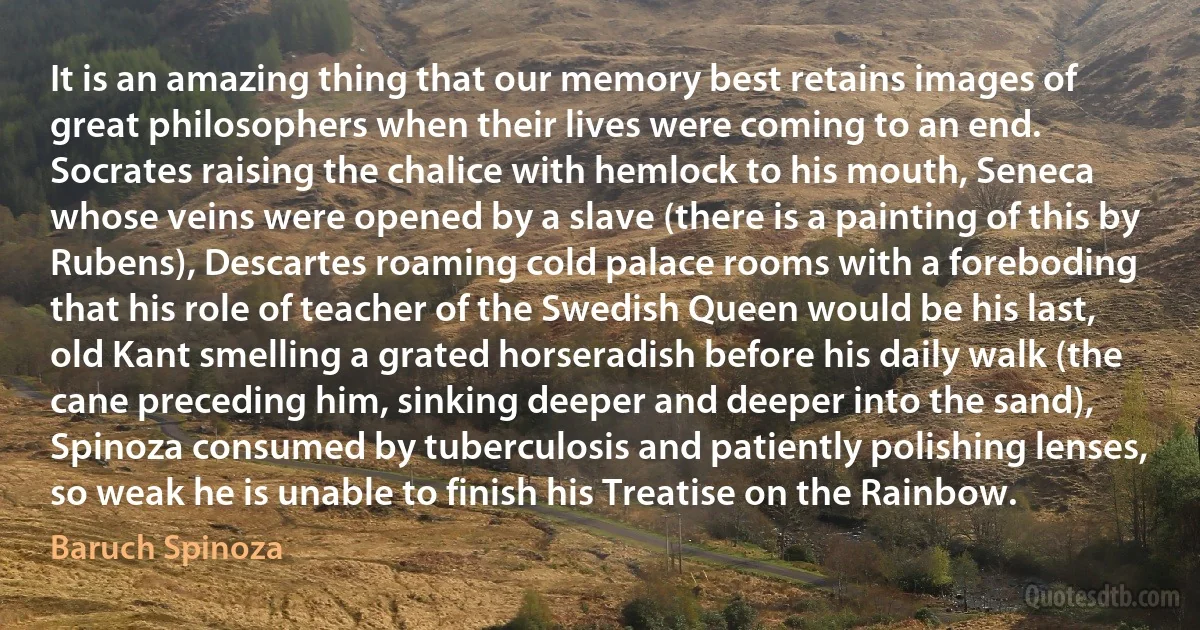
It is an amazing thing that our memory best retains images of great philosophers when their lives were coming to an end. Socrates raising the chalice with hemlock to his mouth, Seneca whose veins were opened by a slave (there is a painting of this by Rubens), Descartes roaming cold palace rooms with a foreboding that his role of teacher of the Swedish Queen would be his last, old Kant smelling a grated horseradish before his daily walk (the cane preceding him, sinking deeper and deeper into the sand), Spinoza consumed by tuberculosis and patiently polishing lenses, so weak he is unable to finish his Treatise on the Rainbow.
Baruch SpinozaRelated topics
best chalice cold coming daily end finish foreboding great last lives memory mouth palace polishing queen rainbow roaming sand slave teacher thing treatise tuberculosis walk kant descartes rubens socratesRelated quotes
Every now and again I get approached by "celebrities" [saying] "oh, you're doing a great job mate, I think it's wonderful what you're doing". Ok, and what you're gonna do? You're gonna make a freaking film now, aren't you? You're gonna make another bloody record! You're gonna stand in front of tens of thousands of people, you're gonna go on chat shows watched by millions of people! Are you gonna bring this subject up yourself? No! Why? "Me, me, me!" "I don't wanna affect my carrer!" I tell you... anyone in the public eye - come nowhere near me unless you are prepared to put your-bloody-self when your mouth is. Walk the talk or walk the other way!

David Icke
Imagine that for hundreds of years your most formative traumas, your daily suffering and pain, the abuse you live through, the terror you live with, are unspeakable - not the basis of literature. You grow up with your father holding you down and covering your mouth so another man can make a horrible searing pain between your legs.... You learn how to leave your body and create someone else who takes over when you cannot stand it any more. You develop a self who is ingratiating and obsequious and imitative and aggressively passive and silent - you learn, in a word, femininity.

Catharine MacKinnon
Ridding Iraq of weapons of mass destruction. That was the whole idea, right? That‘s why we went. I am reluctant to let that fact disappear down the memory hole, because if - as the war ends, or at least starts to end - if, at this time, the history of the war is written as us going there to topple the regime of a bad man when that frankly isn‘t why were told that we were going there - Aren‘t we still at risk of making this horrific mistake again? And, aren‘t we letting the people who foisted the WMD idea on us, not many years ago, aren‘t we sort of letting them get away with it?

Rachel Maddow
Harry Dresden: On the whole, we're a murderous race. According to Genesis, it took as few as four people to make the planet too crowded to stand, and the first murder was a fratricide. Genesis says that in a fit of jealous rage, the very first child born to mortal parents, Cain, snapped and popped the first metaphorical cap in another human being. The attack was a bloody, brutal, violent, reprehensible killing. Cain's brother Abel probably never saw it coming. As I opened the door to my apartment, I was filled with a sense of empathic sympathy and intuitive understanding. For freaking Cain.

Jim Butcher
Short of climbing aboard a time capsule and peeling back eight and one-half decades, James Cameron's magnificent Titanic is the closest any of us will get to walking the decks of the doomed ocean liner. Meticulous in detail, yet vast in scope and intent, Titanic is the kind of epic motion picture event that has become a rarity. You don't just watch Titanic, you experience it - from the launch to the sinking, then on a journey two and one-half miles below the surface, into the cold, watery grave where Cameron has shot never-before seen documentary footage specifically for this movie.

James Berardinelli
